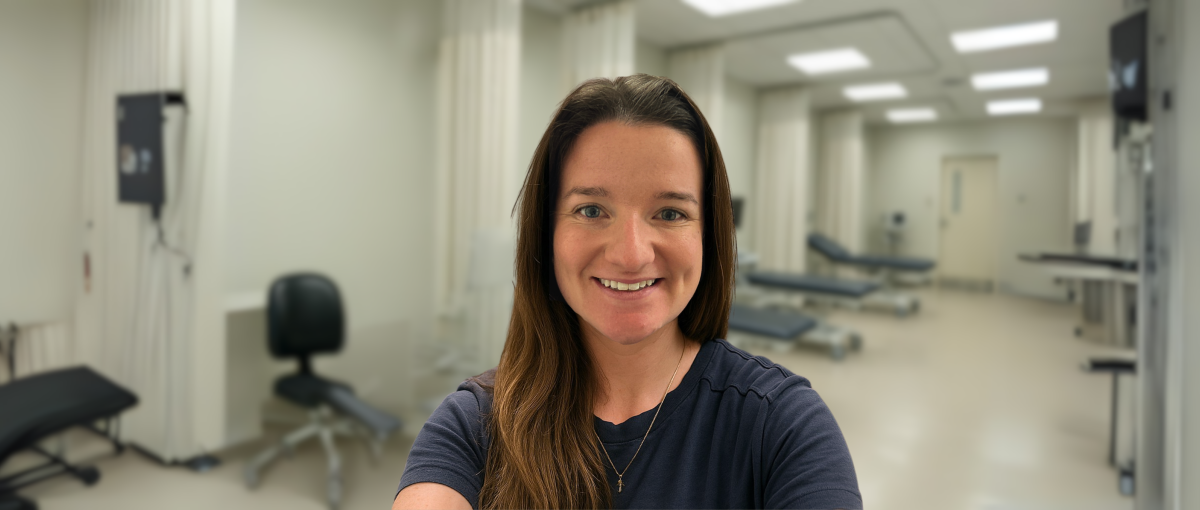Meet Molly Ellert, physiotherapist, St. Mary’s Hospital, Camrose

May 22, 2025
By Peter Rybar, social media advisor
When Molly Ellert walks through the halls of St. Mary’s Hospital in Camrose, she’s just as likely to pass a familiar patient as she is a colleague she knows by name. And that’s exactly how she likes it.
“I grew up in a small town,” Molly says. “Working in a community like this one, where you really get to build relationships with people, that’s been one of the most rewarding parts of my career.”
Molly is a physiotherapist who has spent the past five years caring for patients at St. Mary’s. Her connection to the site runs deep. She completed her final placement there as a student and joined the team shortly after. It felt like the perfect fit from the start, both professionally and personally.
“I did my undergrad and my master’s here in Camrose,” she says. “When the job opened up right after graduation, it just all lined up. I feel really lucky.”
Molly’s story reflects something bigger. It highlights the vital role physiotherapists play in rural healthcare settings. At smaller sites like St. Mary’s, physiotherapists support a wide range of patient needs. They help people recover from strokes, regain mobility after surgery or illness and even explore care gaps that are often overlooked, such as postpartum support.
"You’re kind of a jack-of-all trades here. In larger centres, things can get very niche. But here, you’re using all the skills you learned in school. It keeps you on your toes."
Physiotherapist, St. Mary's Hospital
That variety is what fuels Molly’s passion for the job. She’s especially drawn to stroke rehabilitation, a field she finds both medically complex and deeply human.
“Every stroke is different. Even if two people have the same type of stroke, they won’t present the same way,” she says. “It’s like a puzzle to solve. But more than that, you’re connecting with someone and helping them get back to living their life. That’s what makes it so meaningful.”
At St. Mary’s, Molly and her team support patients throughout their entire care journey. They often meet people right after an acute medical event, work with them through rehabilitation and then see them again as they transition to life at home or in long-term care. That level of continuity is rare in urban hospitals, says Molly.
“You’re really walking alongside them, and that makes a huge difference in the relationships you build.”
The sense of connection extends to her team as well. Whether it’s with nurses, physicians or housekeeping staff, the atmosphere at St. Mary’s is one of true collaboration, Molly says.
“You work with the same people every day, and you become close. When a patient meets a goal or goes home, we all celebrate. That teamwork makes the work so fulfilling.”
To add to her current work with her team, Molly is looking ahead to where she can make an even bigger difference. She is particularly interested in improving care for postpartum patients in acute care settings.
“It’s something I’ve been really curious about,” she says. “I don’t know yet if it’s a gap or just something we haven’t explored enough, but I’d love to see what supports could be in place.”
While professional development can be harder to access in rural areas, Molly says she’s thankful for the support Covenant Health has offered. That includes funding for relevant courses and access to stroke care resources to help her and her team stay up to date with best practices.
“It takes more effort to find webinars or research opportunities when you’re not at a large centre,” she says. “But we have an amazing stroke team here that is always pushing to learn and improve. They’ve been such a support.”
For students or early-career professionals considering physiotherapy, Molly encourages keeping an open mind, especially when it comes to rural health care.
“You need to be adaptable and willing to learn based on the resources you have,” she says. “But the reward is huge. You build real relationships with your patients and your co-workers. You see the full picture of someone’s care, and you help them move forward.”
That impact never gets old for Molly.
“There are hard days, of course,” she says. “But at the end of the day, it’s about giving your best to someone. And more often than not, they see that and are incredibly appreciative. It makes everything worth it.”